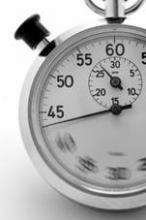Surgeons who took a 20-second micropause every 20 minutes during lengthy surgical procedures had less fatigue and improved levels of strength and technical accuracy, compared with those who did not take such breaks, results from an experimental study demonstrated.
The strategy "translates into better surgeon comfort and, we hope, potentially decreased long-term chronic pain and disability," Dr. Dominique Dorion and Dr. Simon Darveau reported online July 20, 2012, in Annals of Surgery. "The effect on surgical precision, complications, and a potential link with outcomes remains to be evaluated."
Dr. Dorion and Dr. Darveau of the division of otolaryngology/head and neck surgery in the department of surgery at the University of Sherbrooke (Que.) hypothesized that a micropause (defined as a formal 20-second break every 20 minutes of work) would decrease discomfort and improve strength and precision during common, reproducible surgical procedures that lasted at least 2 hours. A total of 16 surgeons were evaluated three times: once before any surgery (control), once after a surgical procedure that lasted at least 2 hours, and once after the same procedure but with the inclusion of a 20-second micropause every 20 minutes (Ann. Surg. 2012 July 20 [doi:10.1097/SLA.0b013e31825efe87]).
Surgeons taking a micropause were instructed to stop operating every 20 minutes, remove themselves from the working station, and stretch their neck and shoulders for 20 seconds. The researchers evaluated discomfort with a 100-mm visual analogue scale with questions targeted to specific anatomy including the neck, shoulder, wrists, and hands (0 = no discomfort; 100 = maximal discomfort). They evaluated fatigue by asking the surgeons to stand still and hold a 2.5-kg weight with the dominant arm fully extended at 90-degree flexion and 15-degree abduction for as long as possible without moving. They evaluated accuracy by asking the surgeons to hold a pair of Metzenbaum scissors and follow a star-shaped track on a board without touching the outside of the star.
Dr. Dorion and Dr. Darveau found that all variables studied improved significantly when surgeons took micropauses. For example, in the evaluation of discomfort levels, all pairwise comparisons reached a significant P value of less than .05 in favor of micropauses for each anatomical area except for the eyes and legs. In the evaluation of muscle fatigue, a 33% reduction in holding time of the 2.5-kg weight was observed in surgeons who did not take micropauses (P less than .001). In the evaluation of accuracy, the average number of errors was seven times higher when surgeons operated without taking micropauses (P less than .001).
The researchers noted that two qualities are needed for micropauses to be successful in the surgical setting: "They must be active rather than passive, and they must be much more frequent than intuitively required," they wrote. "In other words, if one is left to decide when to pause, breaks will become too few and too far apart, and the interval too long."
The authors stated that they had no relevant financial disclosures.

